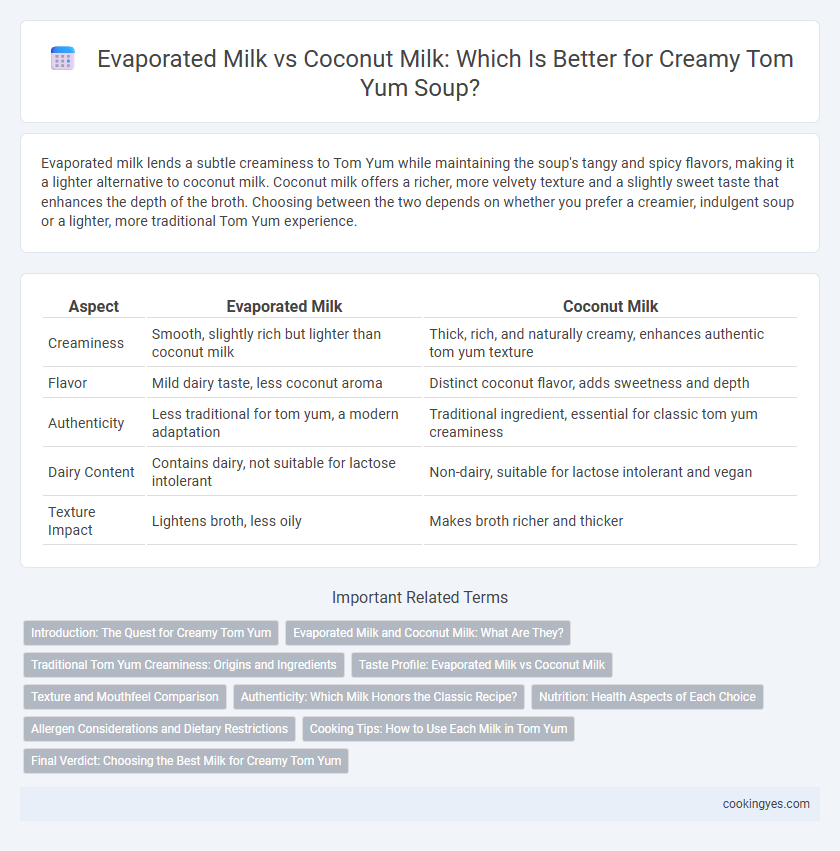Evaporated milk lends a subtle creaminess to Tom Yum while maintaining the soup's tangy and spicy flavors, making it a lighter alternative to coconut milk. Coconut milk offers a richer, more velvety texture and a slightly sweet taste that enhances the depth of the broth. Choosing between the two depends on whether you prefer a creamier, indulgent soup or a lighter, more traditional Tom Yum experience.
Table of Comparison
| Aspect | Evaporated Milk | Coconut Milk |
|---|---|---|
| Creaminess | Smooth, slightly rich but lighter than coconut milk | Thick, rich, and naturally creamy, enhances authentic tom yum texture |
| Flavor | Mild dairy taste, less coconut aroma | Distinct coconut flavor, adds sweetness and depth |
| Authenticity | Less traditional for tom yum, a modern adaptation | Traditional ingredient, essential for classic tom yum creaminess |
| Dairy Content | Contains dairy, not suitable for lactose intolerant | Non-dairy, suitable for lactose intolerant and vegan |
| Texture Impact | Lightens broth, less oily | Makes broth richer and thicker |
Introduction: The Quest for Creamy Tom Yum
Evaporated milk provides a rich, slightly caramelized creaminess that enhances Tom Yum's bold flavors without overpowering its characteristic sour and spicy notes. Coconut milk offers a naturally sweet, silky texture that balances the heat and citrus elements, delivering an authentic Thai taste. Choosing between evaporated milk and coconut milk ultimately shapes the soup's depth, mouthfeel, and traditional appeal.
Evaporated Milk and Coconut Milk: What Are They?
Evaporated milk is a concentrated, shelf-stable dairy product made by removing water from fresh milk, resulting in a creamy texture without added fat. Coconut milk is a plant-based liquid extracted from grated coconut meat, known for its rich, sweet flavor and creamy consistency essential to traditional Tom yum. The choice between evaporated milk and coconut milk impacts Tom yum's creaminess; evaporated milk offers a subtle dairy richness while coconut milk provides a distinct coconut aroma and natural sweetness.
Traditional Tom Yum Creaminess: Origins and Ingredients
Traditional Tom Yum achieves its signature creaminess primarily through the use of coconut milk, which imparts a rich, aromatic texture that balances the soup's spicy and sour flavors. Evaporated milk, while sometimes used as a lighter or dairy-based alternative, lacks the authentic sweetness and coconut fragrance essential to the classic Thai dish. The origin of Tom Yum's creamy variant is deeply rooted in Southern Thai cuisine, where fresh coconut milk is a fundamental ingredient that enhances the depth and complexity of the broth.
Taste Profile: Evaporated Milk vs Coconut Milk
Evaporated milk in Tom Yum adds a rich, creamy texture with a slightly caramelized, milky sweetness that balances the soup's spicy and sour notes without overpowering them. Coconut milk imparts a distinct, tropical creaminess with naturally sweet, nutty flavors that enhance the soup's aromatic herbs and lemongrass while adding a smooth, velvety mouthfeel. Choosing evaporated milk results in a subtler, more neutral creaminess, whereas coconut milk introduces a pronounced, layered flavor profile characteristic of traditional Thai cuisine.
Texture and Mouthfeel Comparison
Evaporated milk provides a smoother, silkier texture to Tom Yum, enhancing creaminess without overpowering the traditional flavors. Coconut milk contributes a richer, thicker mouthfeel, adding a natural sweetness and depth that complements the spicy and tangy elements of the soup. The choice between evaporated and coconut milk significantly influences the soup's balance, with evaporated milk offering a lighter, creamier finish and coconut milk delivering a velvety, full-bodied experience.
Authenticity: Which Milk Honors the Classic Recipe?
Coconut milk is traditional in authentic Tom Yum recipes, delivering the rich, creamy texture and subtle sweetness that define the classic Thai soup. Evaporated milk offers creaminess but lacks the distinctive coconut flavor essential to the original taste profile. For genuine Tom Yum creaminess and authenticity, coconut milk honors the classic recipe's heritage and flavor balance.
Nutrition: Health Aspects of Each Choice
Evaporated milk adds creaminess to Tom Yum while providing higher protein and calcium but also increased saturated fat and calories compared to coconut milk. Coconut milk, rich in medium-chain triglycerides (MCTs), supports metabolism and contains antioxidants but is higher in saturated fat and calories, which may impact heart health. Choosing between evaporated milk and coconut milk influences the nutritional profile of Tom Yum, with evaporated milk offering more protein and coconut milk delivering lauric acid with potential health benefits.
Allergen Considerations and Dietary Restrictions
Evaporated milk offers a creamy texture to Tom yum but contains dairy allergens, making it unsuitable for those with lactose intolerance or milk allergies. Coconut milk provides a rich, dairy-free alternative that aligns with vegan and lactose-free diets, enhancing creaminess without triggering common milk allergies. Choosing between evaporated milk and coconut milk depends on individual dietary restrictions and allergen sensitivities.
Cooking Tips: How to Use Each Milk in Tom Yum
Evaporated milk adds a rich, velvety texture to Tom Yum without overpowering its traditional sour and spicy flavors, making it ideal for those seeking a milder creaminess. Coconut milk provides a naturally sweet and aromatic depth, enhancing the soup's authentic Thai character while balancing the heat from chili and lemongrass. When using evaporated milk, gently simmer to prevent curdling, whereas coconut milk should be added towards the end of cooking to preserve its delicate flavor and creamy consistency.
Final Verdict: Choosing the Best Milk for Creamy Tom Yum
Choosing between evaporated milk and coconut milk for creamy Tom Yum depends on flavor preference and authenticity. Coconut milk delivers a rich, naturally sweet, and traditional Thai taste that perfectly complements the spicy and sour elements of Tom Yum. Evaporated milk provides a milder creaminess with a slightly caramelized note but lacks the distinctive Thai flavor profile essential for an authentic creamy Tom Yum.
Evaporated Milk vs Coconut Milk for Tom yum creaminess Infographic

 cookingyes.com
cookingyes.com